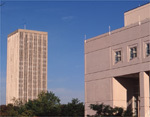

By Carol Olechowski
Rami Hyary knows motivation and talent when he sees them. So when he had an idea for an initiative that will enable students to use their expertise in giving new business ventures a jump start - and, in the process, form a company that may employ them after graduation - he brought it to his alma mater, the University at Albany.
Hyary, who graduated from Albany in 1986 with a psychology major and a minor in computer science, pitched the idea to one of his former professors, Peter Bloniarz of the Department of Computer Science. With Department of Management Chair and Professor Cecilia Falbe, Bloniarz and Hyary developed an academic program to enroll students selected for the new venture team in a School of Business internship program this semester, and in an independent study course with Falbe next spring.
In response to a letter from School of Business Assistant Dean John Levato, a number of students indicated their interest in the New Venture Internship. Hyary first interviewed students by telephone; later, he, Bloniarz, and Falbe conducted face-to-face interviews for the positions of chief executive officer, chief financial officer, and vice president for marketing.
Three students were selected for the program, which Bloniarz termed �an experiment for the University.� They will work with outside companies that have concepts for product development, in a setting supported by both an academic environment and the practical experience offered by the sponsoring firm. Falbe noted that she and Bloniarz are �excited by the prospect of melding academics with the fundamentals of developing and launching a new venture.�
As Hyary conceptualized it, the class will �accelerate the process of forming a company.� It will also evolve into a corporation itself, with each of the students assuming an executive role. �I gave them titles because I wanted them to be clear where the responsibilities in the company lie,� explained the native of Israel. �Someone has to be accountable for the business plan; for outside communications and product research; for budgets, expenses, product pricing, and distribution; and for computer programming.�
Attorney Rich Honen of Honen & Wood, Albany - a firm that specializes in startups - will advise the group on legal issues related to the setup of the company. Honen will be working with students Thomas Amenedo, Chia (Wendy) Hsu, and Margaret Pitta, who are serving as CEO, CFO, and marketing VP, respectively, of the yet-to-be-named corporation. A fourth student is being sought to fill the position of chief technical officer. The young entrepreneurs, who are serving as unpaid interns, will earn six credits each for their internship-related academic work.
The class is starting out small, with only four student participants, but Hyary predicts expansion. �What we are trying to do is produce a prototype that will be working by late in the second semester [Spring 2001],� he said. At the conclusion of the yearlong course, added Bloniarz, who currently serves as interim director of the University�s Center for Excellence in Teaching and Learning, �the students will present their business plan to a panel of venture capitalists and other potential investors. Another possibility is for a company to develop the product or service in-house.�
Eventually, Hyary hopes to launch four new teams of student entrepreneurs each academic year. The first group has already developed a mission statement: �to create an environment in which information is kept confidential on the Internet.� Hyary declined to offer further details but acknowledged that that information will not include financial transactions.
By mid-September, the corporate officers were eager to assume their duties. Margie Pitta, the marketing VP and the only junior in the class, signed up for the course because �it is allowing me augmented experience in business. I knew that if we were to have just four students, the work was not only going to be marketing, and that everybody would end up doing a little of everything, which is what happens at small companies.�
A business administration major with a concentration in finance and marketing, Pitta hopes �to apply valuable experience from this internship to the career I choose.� Her summer 2000 internship with Acquis Consulting Group, LLC, in New York City allowed her to �work with clients to prepare and implement marketing plans for a variety of products and services.� The Cold Spring Harbor, N.Y., native - whose extracurricular activities at Albany have included tutoring and playing on the Division I women�s lacrosse team - is grateful for the �extensive assistance� she and her classmates have received from their mentors and the University. �Without them, this program would not have been possible.�
Pitta recognizes that plenty of hard work awaits her. �Starting a company from scratch is going to be a challenging endeavor full of speed bumps and hurdles, but when it is accomplished, it will be something that we can all look back at and be proud of,� she commented.
For Wendy Hsu, a senior whose family emigrated from Taiwan to Queens, the prospect of establishing a small company that will, in turn, assist in launching other startup firms offers �lots of opportunity and challenge.� This past summer, she worked for an Internet startup and recalled that it is �very challenging to start a company.�
As CFO of the student-run venture at Albany, the finance and MIS major will work with an outside accountant to �keep track of expenses by doing financial statements, balance sheets, and a business prospectus.� She is delighted to be participating in an enterprise that �many students have probably never been involved with. I am being exposed to a lot of legal and marketing aspects of business, and learning about teamwork, as well. Once I go out into the real world, I�ll understand all aspects of business structure. I�ll be ready for the challenges of the business world.�
CEO Tom Amenedo recently completed a summer internship in venture capital, �the flip side of what we�re trying to accomplish now.� He signed up for the class because �I saw what startup companies go through to reach the point where they�re seeking funding. Our goal is to seek capital from an outside group.�
Observed Amenedo, a senior business administration major with a concentration in finance and MIS: �Startups really are a driving force in the economy right now. If you can get exposure to a startup at a high level, it�s a very unique opportunity - especially in the very early stages of a company, when it�s really nothing more than an idea. It gives you a better understanding of how things are going to be in the future, when you�re working.�
Amenedo is not certain what he will do after graduation next spring; however, he is confident that his degree will offer �a bunch of different things I can pursue, including the startup. If it takes off and we have funding before I graduate, then that�s definitely an opportunity I can continue to work on.�
In fact, retaining Albany graduates in the Capital Region - and giving the University a higher profile in the area business community - were two of Hyary�s objectives in proposing the enterprise: �I want to get the University intimately involved with creating startups - the whole Tech Valley concept. There�s a lot of initiative here at Albany.�
In addition to his connections as former student, alumnus, and onetime employee - he worked at Albany from 1987 to 1991, and helped to establish Admissions� first computer network - Hyary brings something else to the table: 15 years of expertise in the computing field. His company, Acuitive, Inc., which helps early stage startups in network infrastructure and e-business accelerate their growth, boasts offices nationwide, including one in Silicon Valley. Acuitive president Mark Hoover �volunteered to visit and give the students feedback on their efforts,� Hyary said. �It isn�t often that people living in Albany can have someone from Silicon Valley come to them and say how valuable their work is.�
The entire project, he pointed out, is �a win-win situation� for all involved. Hsu, Amenedo, and Pitta acquire entrepreneurial experience, academic credit, the opportunity to work with Silicon Valley experts, and the possibility of post-graduate employment. Startups receive the help they need to make the leap from concept to reality. And the Capital Region formulates a way of accelerating startup businesses and strengthening its economy.
�Any obstacles we face [in this venture] can be overcome with enough motivation and talent,� Hyary stated. �Albany students have plenty of both.�
Urban Education
By Donald A. Biggs, professor, School of Education
Of all the challenges facing educators, none is more daunting
than the pressing need to figure out ways to improve the academic achievement
of children and youth who attend schools in our inner cities. Throughout
the past half century, much of the theory and research on school achievement
was focused on identifying the deficits of these students, their families,
and their communities. As a result, the professional and popular press
was encouraged to paint bleak pictures of urban schools, as hopeless places
for students and their teachers. Researchers were successful in identifying
factors related to underachievement in urban schools, but most involved
conditions over which schools had little control. They accumulated information
about the risk conditions in these schools, but found out very little
about the strengths and resources in them. Our knowledge about the talents
of urban children and youth is fragmentary, at best.
University students who often have no firsthand knowledge of inner-city urban communities are unaware of their negative social stereotypes about these youth. Because their views tend to focus on the negative traits of a few, they often are afraid of teaching in these schools and fear going into these communities. Although we do not deny the presence in urban schools of youth who are at risk of academic failure or delinquent behavior, we also point out that most of the students in urban schools do not engage in �at-risk� behaviors.
In the University at Albany program in urban education, we view urban students and their parents as being engaged in a gallant struggle to get a good education. However, they often face a paradox in which even their positive beliefs about education, their high aspirations, and their positive beliefs about their abilities are dismissed as �unrealistic� because they are in conflict with the negative social stereotypes that contaminate our urban schools and communities. Malcolm X described such an encounter in his autobiography when he told his teacher that he wanted to be a lawyer. The teacher half smiled and said, �Malcolm, one of life�s first needs is for us to be realistic.� The implicit message was clear. His story is but one dramatic case of our �collective blindness� concerning the strengths of urban youth. Additional evidence is found in the research that African American and Latino students are overrepresented in vocational track classes and underrepresented in gifted and talented classes.
The UAlbany Program in Urban Education provides information about the promotive, risk, and protective characteristics of urban youth, as well as the positive and negative conditions in urban schools and communities. However, we also make it clear that future educators in urban communities need to examine some of their own �cultural baggage� that colors their vision of the students, parents, and communities. They must make a sincere attempt to understand the world views of those who live in urban communities. The emphasis in all of our courses is on fieldwork experiences in urban schools, where we expect students to learn communication and relationship-building skills that will facilitate their work as educators in urban schools.
An important part of the urban education program at UAlbany is our Summer Urban Youth Leadership Institute. It provides opportunities for graduate and undergraduate students in urban education to have �hands-on� experiences with urban children and youth. In our sixth institute in the summer of 2000, undergraduate and graduate students from the University at Albany spent seven weeks at Livingston Middle School helping high school students design and implement a series of workshops on school success for students at Arbor Hill Elementary School. Our approach to urban youth leadership development aims to validate the educational aspirations of urban students and foster their identification with academic and social concerns in their communities. This summer, we asked the high school and college students to identify the lessons that could be learned from the American civil rights movement and then teach these lessons to students at Arbor Hill Elementary School.
This academic year, the Office of Urban Education programs will be introducing graduate- and undergraduate-level internships in urban education. A University faculty member and a staff member from the schools supervise these courses. The fieldwork experiences in these courses will be focused on one professional area of the school, such as administration, instruction, or personnel services. In another new course in urban education, students will be engaged in group investigations in the issues surrounding the implementation of the New York State Learning Standards in urban schools. The students will have the opportunity to study how schools have approached this task and the strategies used to achieve the schools� goals. Then they will be able to make some hypotheses about possible outcomes and conclude with their own recommendations regarding how to successfully implement the New York State Learning Standards in urban schools.
For more information, contact the Office for Urban Education, Education Building, Room B-20, Albany, N.Y., 12222, or call (518) 442-5150.
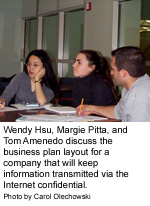
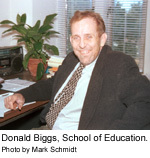
By Christine McKnight
Life Sciences Research Building: Bids for the Life Sciences Building will be opened Oct. 31, with groundbreaking now tentatively set for spring. The $67 million facility will provide laboratory and support space for 39 research groups from biology, chemistry and bio-psychology. It will go up directly east of the academic podium.
Fine Arts Sculpture Studio: Underground utilities have been installed and the superstructure of the Fine Arts Sculpture Studio is now going up. A sample wall of the masonry and metal exterior has been erected for public inspection on the site, which is on the eastern edge of the main campus. The $3.8 million project is scheduled for completion in June of 2001.
Boiler Replacement: In a Capital Plan project, Boiler No. 2, one of the original four boilers on the main campus, is being replaced, with the work to be done by Dec. 1. The University has already replaced Boiler No. 3 and rebuilt No. 1. The University heats its main campus complex with a combination of oil and natural gas.
New Appointments
Sharon Dawes has been appointed a visiting associate professor in the Department of Public Affairs and Policy at UAlbany�s Rockefeller College. Dawes, director of the Center for Technology in Government, will develop course work and concentrations in government information management at the master�s degree and Ph.D. levels. Next spring she will teach the first course developed in this new departmental initiative, PAD 521, Foundations of Government Information Management.
Michael Boots, formerly director of Annual Giving, has assumed the position of director of development for Annual Giving, overseeing the Annual Fund�s calling center, direct mail operation, and President�s Club activity. In addition, Boots will work closely with the new Annual Fund alumni leadership volunteers and be the President�s Club development officer for the University Libraries and the School of Education.
Christina Sebastian, formerly assistant director of Annual Giving, has assumed the position of director of the Annual Fund, overseeing the day-to-day operations of the calling program for the Annual Fund. She will also work closely with the senior class in developing its senior class gift project.
Diane Bouchard, formerly program coordinator for Annual Giving, has assumed the new position of Advancement Information System coordinator, reporting to Development Services. In this role Diane maintains the accuracy of the AIS database, and acts as a liaison to other campus departments.

New
Faculty
By Tim Kelly
Thoroddur Bjarnason recently joined the
University faculty as an assistant professor in the sociology department.
He said that the University had been on the top of his list and that the
school�s �sociology department is a very good and dynamic place to be.�
An Iceland native, Bjarnason was a member of the Board of National Representatives for the European School Survey Project on Alcohol and Drugs. The project was created to standardize data collection for a comparative study of alcohol and drug use in European countries and the U.S. The results will be used for policy analysis and further research into the causes of alcohol and drug use. Bjarnason also acted as a consultant for the project to several East European countries.
Bjarnason received his doctorate in sociology from the University of Notre Dame, where he received the Alumni Association Award for Excellence in Research. He has published numerous papers and currently has several works in progress. Bjarnason has presented papers at a number of conferences, including both the 93rd and 94th annual meetings of the American Sociological Association. His research interests are criminal deviance and adolescent drug use.
Peter Ross has returned to the University as a full-time lecturer in the Department of Management Science and Information Systems in the School of Business. Ross supervised several second-year MBA student field projects last year as a visiting lecturer and will continue to oversee the projects this year; he will, in addition, teach an introductory-level course.
Ross cultivated his knowledge of MIS over the past three decades with businesses and consulting firms across the state. He initiated the replacement of old MIS systems for Troy Eye Associates and Light & Power Productions. He has also assisted clients as an independent consultant.
After earning his MBA from UAlbany in 1974, Ross established and managed a consulting office for Ernst & Young. Later, he was president of Mahoney Cohen Consulting Corp. He was also vice president of finance for the Sports Training Institute.
Charles Shepherdson has been appointed to fill the position of director of graduate studies in the Department of English. Shep-herdson says he �will be working closely with the administration to rewrite the graduate curriculum, and to establish some connections with other departments in the University, in the hope of building a strong and nationally prominent program in the humanities.�
Shepherdson completed his doctoral work in British poetry and literary theory at Vanderbilt University in 1986 and studied contemporary French and German philosophy over nine summers at the Collegium Phaenomenologicum in Italy. He began working in French psychoanalytic theory and feminism in 1991. In the last two years, Shepherdson has written two books on contemporary psychoanalytic theory as a member in the Institute for Advanced Study in Princeton.
Shepherdson ran a yearlong program on the Constitution as a post-doctoral Fellow with the Henry Luce Foundation in California. He has received support from the Pew Charitable Trust, the Andrew Mellon Foundation, the Folger Institute and the National Endowment for the Humanities. He held a fellowship at Brown University in the Pembroke Center for Teaching and Research on Women. In addition, he recently helped to establish a psychoanalytical studies program as a visiting professor at Emory University.
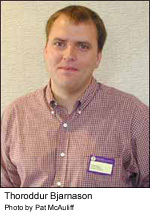
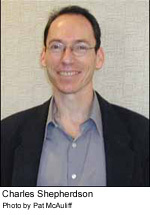
History
Professor Sung Bok Kim Acted as Adviser to Seoul National University
By Greta Petry
Professor of History Sung Bok Kim strides into the office wearing
a baseball cap from Seoul National University, inscribed with the initials
SNU and the motto �Veritas lux mea.�
The Latin phrase means �Truth is my light.�
In many ways, the inscription on the hat not only describes the values and tradition of SNU; it is also a fitting motto for the outspoken Kim, who tells it the way he sees it. You may not always agree with him, but a listener has no problem understanding where Kim stands on any given topic.
This quality may have something to do with his recent invitation to visit Seoul National University from Aug. 23 to Sept. 2, and look over all aspects of university operations, ranging from faculty appointments, promotions, the pay system, admissions policy, university governance, foreign student and faculty exchanges, to advising on curricular and administrative problems. At the end of his visit, he submitted a final report of 22 recommendations in Korean, his native language.
�Seoul National University is the best university in Korea; it is my alma mater as well,� he said. �It is also reputed to be the third best university in Asia - no question about it.�
At the same time, as a public university with 25,000 students, SNU faces challenges. Some, like the fight over general education requirements, can also be found in public colleges and universities across the U.S. Others are unique to SNU.
For instance, the faculty elect the president and deans at SNU, Kim said.
�The University is very politicized, for one thing. For another, it impairs the presidential leadership because of it,� Kim said. �I told them they have to do away with that - I told President Ki Joon Lee of SNU.� Kim�s view is that a university president must have the power to create new programs, and use resources and personnel as he or she sees fit, in consultation with university constituents.
As for University governance, he said, �The faculty, too, must be checked. I don�t care for absolute power, however well intentioned and wherever it is located. It�s just a no-no.�
Kim returned from abroad in time to teach his class of about 150 juniors and seniors about the American Revolution.
�I�m having a good time,� he said. �I am in love with that subject.�
Kim earned his Ph.D. from Michigan State University. He taught at William & Mary and the University of Illinois before coming to UAlbany 27 years ago. For eight of those years he was associate vice president of Academic Affairs and dean of Undergraduate Studies.
Another difference between SNU and UAlbany is the titles.
�Vice presidents are not important over there - the title of vice president is too business-oriented for them. Instead, they have deans - the dean of Academic Affairs, for example. It�s like our federal government, with one Vice President and a Cabinet.�
Still, the farther abroad one goes, some issues remain the same.
�General education is as controversial there as it is here,� Kim said. He gave them his prescription for what a general education curriculum should include: foreign studies, historical study, moral reasoning, digital reasoning, and the liberal arts and sciences. �It should be like those at Harvard, Princeton, Columbia or Williams College,� he said.
Speaking of the UAlbany campus, Kim said, �I don�t want the SUNY Board of Trustees to poke their noses into our curricula.� However, the problem, as he sees it, is the faculty not really having a good grasp of what the liberal education is - in order to promote it without so much confusion. The faculty everywhere seem driven by their convenience, their needs and their interests, which are personal, departmental and collegial in nature, he said. They are not wholly driven by pedagogical considerations, he continued. �This is a problem across the country; it is not just happening here,� he said. �General education is one of the many difficulties affecting higher education everywhere.�
Kim�s opinions are no secret. When he gave the keynote speech at the Phi Beta Kappa ceremony last December, �I told the faculty they have self-abnegated from the responsibility to be the committed carrier of liberal education.�
In Seoul, as at UAlbany, Kim said, �some of the faculty members are not well trained to offer courses that are really comprehensive because their training is too narrow and too one-discipline-oriented. It�s not so much that we don�t want to do it; let�s not pretend we can do it.�
To change this, he said, the faculty must be given time to be trained and prepared. Kim suggested the University train a dozen or so faculty members a year and have them come up with �gorgeous, broadly comprehensive and coherent core curricula courses.�
He also believes the promotion system needs to be changed so that faculty are rewarded for teaching general education courses.
�You build your reputation, your path to advancement, on your research. You don�t get your full professorship because you teach well in general education,� Kim said.
�I talked to Seoul about this. It is difficult to move the faculty in Seoul or here - it is difficult because the faculty are conservatively disposed and entrenched in tradition.�
Kim is equally passionate on the subject of writing intensive courses. �Who complains that students can�t write?� he asks rhetorically. �It is the faculty. And yet, they do not offer enough writing intensive courses and thus do not practice what they preach.�
When he was dean of Undergraduate Studies, Kim said, he proposed four credits for a writing course to encourage professors to offer writing intensive courses, which are labor intensive for the instructor.
�And we still don�t have enough writing courses,� he said.
He contrasts this with �the good old days,� the era when one had to write a senior thesis just to earn a bachelor�s degree.
Kim pronounced his visit to SNU a success.
�I had a very good candid, honest discussion with all the different groups of Seoul National University. I hope that some of my recommendations will be taken seriously by them for implementation.�
Robert
F. Creegan
University at Albany Professor Emeritus
of Philosophy Robert F. Creegan passed away August 10 in LaBaule, France.
He was 85.
A native of Michigan, Creegan graduated from Marietta College in Ohio and Duke University, and did post-graduate work at Vanderbilt University. He taught at several institutions, including Cumberland University and Ohio University, prior to joining the UAlbany faculty in 1952. Creegan, a consultant to the Aerial Phenomena Research Organization, worked with NASA, the British Ministry of Defense, and the National Research Council of Canada to investigate reported sightings of Unidentified Flying Objects (UFOs). The author of The Shock of Existence, The Magic of Truth, and of numerous journal articles and reviews, he helped to create UAlbany�s Borders of Science course, which he taught for a number of years. In addition, he was a longtime chair of the University�s Department of Philosophy. Creegan is survived by his wife, Doris; a son, Charles; and two grandsons.
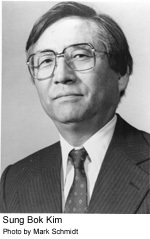
The first Barnes & Noble scholarships
at UAlbany have been awarded for the 2000-01 academic year. From the
left: Ron Casey, assistant manager; Paula Gardley, director of stores;
Jen Cho, regional manager; Carol VanDenburgh, manager of UAlbany�s Barnes
& Noble bookstore; Liz Tucker, athletic scholarship winner; Cheryl Brannock,
general merchandise manager; Will Brand, athletic scholarship recipient;
Sarah Klau, presidential scholarship winner; Elizabeth Green, presidential
scholarship recipient; Garett Argianas, presidential scholarship recipient;
Sara Valencia, presidential scholarship winner; Jennifer Bisneau, scholarship
recipient; and Matthew Fazio, presidential scholarship recipient.
Photo by Mark Schmidt.
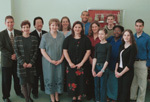
Home Page/ Front Page/ Campus News/ Features/ Sports/ Date Book